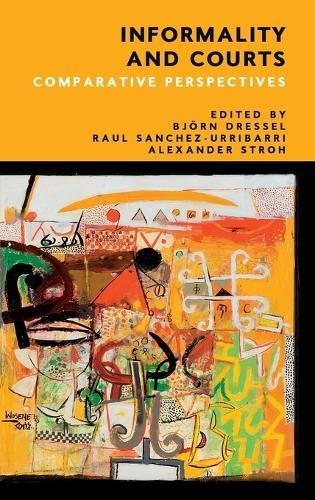Overview
This volume explores an understudied aspect of courts: The extent to which informal institutions and relational networks (e.g., professional, clientelist, family etc.) relations affect how courts are organised and operate. For instance, to what extent can 'good personal relations' outweigh professional merits in judicial appointment processes? Or in what ways do international or domestic judicial networks help protect courts against other branches of power? Our relational-institutional perspective allows us to better understand a variety of important processes for the comparative study of courts including judicial appointments, judicial decision-making, judicial administration, institutional development, inter-branch relations, corruption, and court reform, among others. More importantly, an emphasis on informality sheds new light on the accountability role of courts in democratic regimes, at a time when democracy worldwide is at risk and authoritarian regimes are on the rise. Bringing together the thoughts of scholars with different levels of seniority and disciplinary expertise, this volume offers cross-national engagement with theory, providing systematic analyses of the configuration, operation, and roles of informal institutions and relations, and their importance in different socio-political contexts and legal systems.
Full Product Details
Author: Bjorn Dressel ,
Raul Sanchez-Urribarri ,
Alexander Stroh-Steckelberg
Publisher: Edinburgh University Press
Imprint: Edinburgh University Press
ISBN: 9781399535250
ISBN 10: 1399535250
Pages: 308
Publication Date: 31 December 2024
Audience:
Professional and scholarly
,
Professional & Vocational
Format: Hardback
Publisher's Status: Forthcoming
Availability: Not yet available

This item is yet to be released. You can pre-order this item and we will dispatch it to you upon its release.
Reviews
Most jurisprudence has nothing to say about informal relationships in courts. If mentioned at all, they are often singled out as peculiar pathologies of corrupt or autocratic regimes (usually in the East or South). This remarkably rich collection upends such easy forms of ignorance and simplification. It shows such relationships to be pervasive, multi-form, variable both in degree and kind, and very often central to the ways things work, both inside and outside the formal institutions of the law. Its contributions are scholarly, diverse, illuminating and - very often - astonishing in their range, variety and insights.--Martin Krygier, University of New South Wales Informality and Courts stands as a remarkable collaborative effort, uniting distinguished scholars of judicial systems from around the globe. This volume showcases diverse empirical insights, enriching our understanding of courts and their institutional complexities. A truly international and interdisciplinary work, it is an essential read for anyone seeking an innovative investigation of courts through a groundbreaking relational perspective.--Sida Liu, The University of Hong Kong
Most jurisprudence has nothing to say about informal relationships in courts. If mentioned at all, they are often singled out as peculiar pathologies of corrupt or autocratic regimes (usually in the East or South). This remarkably rich collection upends such easy forms of ignorance and simplification. It shows such relationships to be pervasive, multi-form, variable both in degree and kind, and very often central to the ways things work, both inside and outside the formal institutions of the law. Its contributions are scholarly, diverse, illuminating and - very often - astonishing in their range, variety and insights.--Martin Krygier, University of New South Wales Informality and Courts stands as a remarkable collaborative effort, uniting distinguished scholars of judicial systems from around the globe. This volume showcases diverse empirical insights, enriching our understanding of courts and their institutional complexities. A truly international and interdisciplinary work, it is an essential read for anyone seeking an innovative investigation of courts through a ground-breaking relational perspective.--Sida Liu, The University of Hong Kong
Most jurisprudence has nothing to say about informal relationships in courts. If mentioned at all, they are often singled out as peculiar pathologies of corrupt or autocratic regimes (usually in the East or South). This remarkably rich collection upends such easy forms of ignorance and simplification. It shows such relationships to be pervasive, multi-form, variable both in degree and kind, and very often central to the ways things work, both inside and outside the formal institutions of the law. Its contributions are scholarly, diverse, illuminating and - very often - astonishing in their range, variety and insights.--Martin Krygier, University of New South Wales
Author Information
Björn Dressel is an Associate Professor at the Australian National University. Raul Sanchez-Urribarri is Senior Lecturer in Crime, Justice and Legal Studies at La Trobe University, Australia Alexander Stroh is Professor of Political Science at University of Bayreuth, Germany




